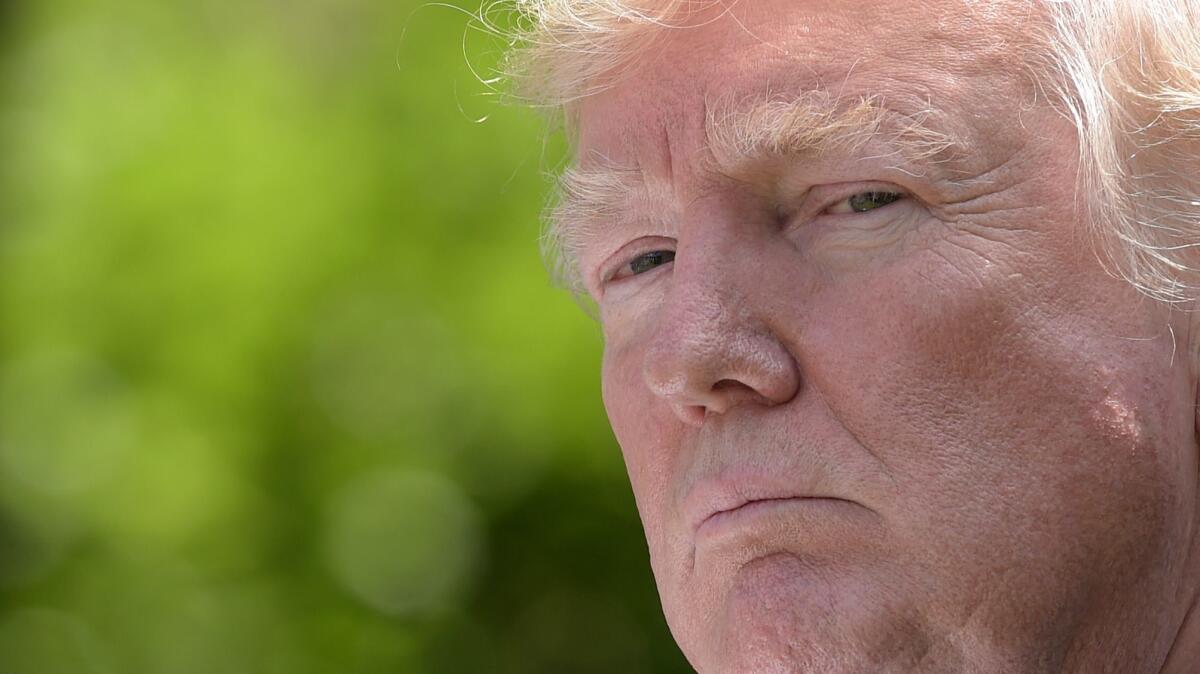Editorial: On impeaching Trump

Former FBI Director James Comey’s testimony Thursday before the Senate Intelligence Committee exacerbated concerns that President Donald Trump may have tried to kill an investigation into his national security advisor, and in so doing committed a criminal offense — obstruction of justice. On the same day but across the Atlantic, the British election that demonstrated surprisingly weak public support for Prime Minster Theresa May served as a reminder of how different the tools are here, in the United States, for dealing with an unpopular or failing elected leader than they are in a parliamentary system.
We cannot call snap elections or votes of no confidence. A president is elected to a four-year term and is not subject to recall. In four years, the people weigh in again and say yes or no to a second term, after they have some perspective on his performance. To cut short a president’s term in office before it is finished is to contravene the will of the people as expressed in the election — the most fundamental act of democracy — and should be done in only the rarest and most exceptional of cases.
Read the editorial series: Our Dishonest President »
The Times has made no secret of its opposition to Trump — to his policies, certainly; but also to his fluid relationship with fact, to his embrace of fringe political theories and movements, to his disrespect for basic institutions of democratic government, to his careless handling of intelligence, to his cavalier attitude toward alliances and partnerships that have stood the country in good stead. We believe his election and continuing tenure as commander in chief are bad for the nation. We see no evidence that he will grow into the job. We look forward to the day when he is no longer president.
The option should be used if the president appears to have committed a serious crime, but also if his actions pose serious and irreversible danger.
The Constitution provides a procedure for a president to be impeached and removed from office. Although the criteria are “treason, bribery and other high crimes and misdemeanors,” and the impeachment process has some of the form of a legal prosecution — with the House of Representatives acting as grand jury and prosecutor and the Senate acting as judge and jury — impeachment ultimately is a question of political power. Congress will define for itself what constitutes an impeachable and removable offense, and no court can step in to override its decision. The option should be used if the president appears to have committed a serious crime, but also if his actions pose a serious and irreversible danger to the nation. If it is merely a question of policies with which we disagree, that is a problem better left for the next election.
So — should President Trump be impeached?
The question does not lend itself to a bright line. Instead, it opens up a kind of zone in which impeachment must be seriously considered. That’s where we find ourselves today. Credible assertions have been made that the president obstructed justice. A criminal prosecutor might even proceed to a grand jury at this point — but the time to draw up articles of impeachment is not here.
Why move slowly? For several reasons. All we have now is Comey’s say-so on his own interpretation of statements Trump made in private meetings. Former FBI Director Robert Mueller is leading a Justice Department investigation into alleged Russian interference into last year’s presidential election, and the scope is wide enough to include the kinds of things Comey spoke of in the Senate hearings. It would seem precipitous to move toward impeachment before that probe is complete, absent some intervening revelation of intolerable action on the president’s part.
Furthermore, a majority of both houses is in the hands of Trump’s party, so the amount of evidence needed to have any realistic chance of removing the president from office would be especially high. And a lengthy proceeding that weakens or embarrasses him but does not lead to his removal would certainly deepen the nation’s bitter divisions, probably even more than the 1998 impeachment of Bill Clinton and his acquittal the next year. These are reasons to move cautiously and deliberately.
Action to remove a president outside the course of a regular election is so serious a matter that it could inflict serious damage on the confidence that is needed to make our democratic institutions function. But there is certainly a point at which failure to act in the face of criminal or dangerous conduct becomes more damaging than moving forward.
Congress was approaching that point in 1974 when the House Judiciary Committee sent articles of impeachment against President Nixon to the floor — for obstruction of justice, abuse of power and contempt of Congress because of his role in a cover-up of the Watergate break-in. Nixon resigned before the articles came to a vote.
There is no path for Trump opponents to a quick and easy reversal of fortune. A Trump resignation does not appear likely in the near future. There can be no snap election or vote of no confidence. Impeachment cannot, of course, be ruled out, but we must be aware that it would be a long, painful and destructive path.
But we are now in the zone in which we dissect testimony for evidence of a crime, await more reporting and the results of investigations like Mueller’s, and wonder whether a move toward impeachment is any more damaging than failing to do so.
To read the article in Spanish, click here
Follow the Opinion section on Twitter @latimesopinion and Facebook
MORE FROM OPINION
Talking with Comey, Trump focused on himself, not Russian hacks
In a credibility contest with Trump, James Comey is the obvious winner
Another terror attack, another thoughtless Trump tweetstorm
More to Read
A cure for the common opinion
Get thought-provoking perspectives with our weekly newsletter.
You may occasionally receive promotional content from the Los Angeles Times.










